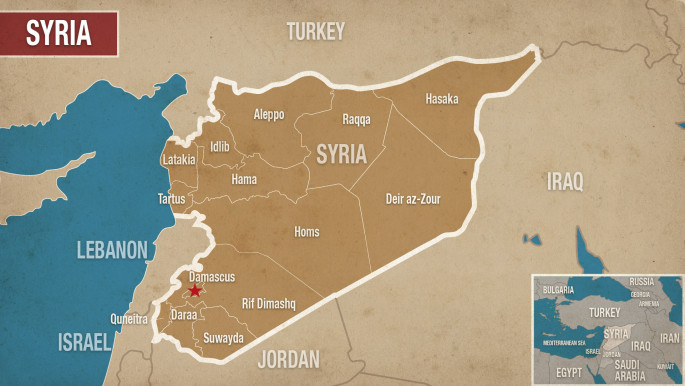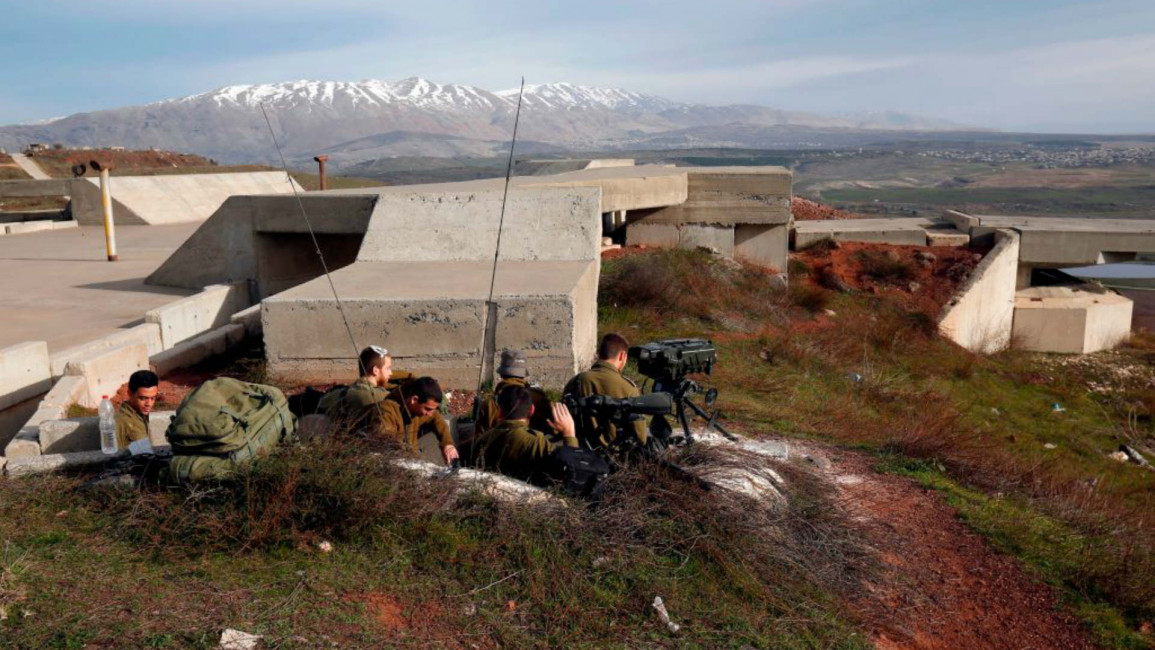
Israel's attack on Syria just killed the Obama doctrine
This is precisely what happened on Saturday. It started with an Iranian drone, launched from one of Iran's manifold bases in the swathes of Syria it now ostensibly occupies, violating Israeli airspace.
Israel retaliated by sending eight jets into Syria. One of its coveted F-16s was then brought down by anti-aircraft fire - reportedly by Iranian-led forces.
This was the first time since 1982 that Israel had one of its jets brought down by any of its enemies. Its response was swift and uncompromising. It unleashed what was its largest attack on Syria in decades, destroying the entire Al Firaq Al Rabiah - Assad's notorious and elite Fourth Armoured Division, stationed just outside Damascus.
Along with this, the Israeli Air Force (IAF) struck at numerous Iranian Revolutionary Guard Corps (IRGC) outposts, as well as the Tiyas Air Base in Homs, also known as the T4 base, the largest in all of Syria. In total, 12 sites were struck by the IAF over the course of a few hours, destroying approximately 50 percent of Assad's air defences.
For all the destruction unleashed by Israel on the Iran-Assad alliance, perhaps the greatest victim of this assault was not a physical target, but a narrative - a narrative that was at the very heart of what has been called the "Obama doctrine" on Syria.
The narrative can best be summed up by Obama's contentions that a no-fly zone (NFZ) in Syria was neither possible nor preferable. In fact, during the US presidential election campaign, it was not Donald Trump but Ben Rhodes, one of Obama's national security advisers, who appeared on CNN contradicting Hillary Clinton's planned policy of implementing an NFZ in Syria.
 |
Israel's action proves that the US failed to act in Syria not because it couldn't, but because it simply didn't want to |  |
According to Rhodes, an "NFZ would not solve the problem". But what exactly was "the problem" in Syria, to the Obama administration?
It certainly was not Assad, Iran or Russia.
Rhodes continued: "If you had… [a NFZ]… in Syria, people would still be killing each other on the ground. ISIL doesn't have planes… They would still be able to massacre people… And we would have to devote an enormous amount of our resources - which are currently devoted to finding ISIL and killing them wherever they are - to maintaining this no-fly zone… it's just not a good use of resources."
This entire narrative relied on the very deliberate policy to ignore the genocide unleashed by the Assad alliance.
While the visceral, vicious, nihilistic "Islamist" violence of IS against minorities and ancient heritage sites captured the imaginations of western audiences in the post-9/11 period, the reality was that Assad and his allies were murdering far more people than IS ever could. The Obama administration sold the idea that the main problem in Syria was IS, while IS were themselves a particularly vicious by-product of Assad's sectarianised war.
Read more: Israeli fighter jet crashes following 'large-scale' Syria bombing raids
Obama was mainly concerned with reducing the immediate threat of IS to the territorial integrity of Iraq, and the interests and security of US regional allies. Syrians being murdered by Assad simply did not figure in the equation.
Though Obama's "do nothing" doctrine had been evident since the beginning of the Syrian war, the rise of IS' "caliphate" in 2014 saw a definitive shift. Accompanying the idea that IS was the main evil in Syria was the idea that the rebel forces were simply not worthy of the implementation of a NFZ.
 |
Russia knew the US had no will to meaningfully support the rebels |  |
Though prior extensive intelligence reports had demonstrated that a NFZ was logistically possible, and there were voices within Obama's administration that favoured one (most notably, Hillary Clinton), Obama remained resolutely opposed to it.
One of the main reasons he cited, in keeping with the need to justify doing nothing to aid Syrians against Assad, was, in his own words in 2015, "unless we can get the parties on the ground to agree to live together in some fashion… no amount of US military engagement will solve the problem".
More infamously, Obama dismissed the Syrian rebels as "farmers and dentists… who didn't have a lot of experience fighting", and who could not "hold ground" or "rebuff vicious attacks" or "organise themselves in a way that is cohesive".
 |
|
| [Click to enlarge] |
It's not only that Obama failed to mention the fact that the rebels had consistently held ground against Assad and Iran, as well as IS, not to mention their ability to make impressive gains with limited resources, but he deliberately ignored the fact that the precarity of the rebels' situation was due to the regime's air capabilities.
Obama's abandonment of anti-Assad rebels coincided with the US effort to arm the YPG against IS. The YPG could only make impressive gains against IS and carve out a stable statelet because they didn't also have to fight Assad, Iran and Russia, meaning they didn't have to contend with the wrath of two airforces.
Unlike Rojava, the "liberated" areas of Syria were made unliveable by Assad and his allies through aerial bombardment in a deliberate attempt to dislodge rebel-supporting populations and savagely limit the function of everyday life in such areas. This is the reason for a refugee crisis that is unprecedented in modern times.
Israel's action on Saturday, destroying half Assad's air defences in a matter of hours, demonstrates precisely what could have been achieved if the US and/or NATO - backed by willing regional allies - imposed a NFZ on the country, neutralising Assad's capacity to use aerial bombardment.
Moreover, it eliminates the idea, beloved of apologists of Assad, Iran and Russia's war in Syria, as well as those who justify Obama's "do nothing" doctrine", that any serious external military intervention against Assad would lead to a military response from Russia – the World War III argument, as it may be called.
 |
The reality was that Assad and his allies were murdering far more people than IS ever could |  |
Russia responded to Israel's devastating attack on the regime in fascinatingly, but unsurprisingly muted terms, simply calling for both parties to "exercise restraint" and avoid further "escalation".
The idea that Russia would have risked a world war if the US, with an airforce technically more powerful than every other airforce on earth combined, had acted to enforce a NFZ on Syria, is an absurdity.
One hardly has to go into the realms of fantasy here - last Wednesday the US struck and killed more than 100 pro-regime forces, including alleged Russian "mercenaries", after they attacked a YPG base containing US military personnel.
Read more: Intervention in Syria wouldn't start World War III
There was no significant response from Russia.
All this once again hammers home that far from increased US intervention escalating the Syrian war and making the lives of Syrians worse, there's no doubt that many lives taken by the genocide could have been saved. Russia's intervention in Syria was always predicated on the fact that by 2013, following the Kerry-Lavrov deal, it knew the US had no will to meaningfully support the rebels.
If the US had enforced a NFZ when it was first seriously proposed in 2012, there would have been no massacres by the Assad alliance using sarin, chlorine, napalm or white phosphorous.
There would have been no cleansing of populations leading to a huge refugee crisis that has spilled into Fortress Europe dangerously boosting far-right populism. There would have been no room for IS to rise in the first place.
We see Assad and his allies continue their vicious bombardment of the few remaining rebel-held areas, with hundreds of thousands more being cleansed and more Syrian lives being lost.
Israel's action was an act of pure self-interest, but it proves that the US failed to act in Syria not because it couldn't, but because it simply did not want to.
Syrian lives just simply aren't worth saving.
Sam Hamad is an independent Scottish-Egyptian activist and writer.
Opinions expressed in this article remain those of the author and do not necessarily represent those of The New Arab, its editorial board or staff.




